上海牛津版初中英语语言点及语法总结.docx
初中英语上海牛津版(语言知识分布)

九年级下册
M1Explorations and exchanges
U1 Great explorations
结果状语从句;too... to;enough to
U2 Culture shock
目的状语从句;状语从句总复习
M2 Environmental problems
U3 The environment
情态动词+被动语态
M3 Animals
U5 Save the endangered animals
现在完成时中的被动语态
U6 Pets
It is + adj. + for/of + n. + to do
M4 Discovery
U7 The unknown world
原因状语从句;because of
U1 People around us
定冠词
U2 Traveling around the world
专有名词;连词and,but和or
M2 Man’s best friends
U3 Our animal friends
反身代词;方位介词
U4 Save the trees
现在进行时
M3 Natural elements
the same和different的用法
U4 Natural disasters
It作形式主语
M3 Sport and health
U5 Sports
时态复习;被动语态复习
U6 Caring for you health
形容词+that从句;复习宾语从句
五种基本句型
(完整)牛津上海版英语九年级上册全书语法知识汇总,推荐文档

I.现在完成时的概念。
G9 GRAMMAR 现在完成时①表示过去发生的动作对现在造成的影响或结果She has been ill for three days. (她病了三天了。
)②表示从过去某一时间开始一直持续到现在的动作或状态。
We've known each other since we were children. (我们从小就认识。
)I have been a member of the Party for 10 years.II.构成:”助动词have, has + 过去分词”注:规则动词的过去分词的构成与过去是相同,不规则动词的过去分词见附表。
练. 把下面变否定句、一般疑问句并作肯定和否定回答。
1.I have done my homework.否定句:一般疑问句:回答:2.The plane has arrived.否定句:一般疑问句:回答:III.现在完成时用法归纳1.现在完成时表示过去发生的动作现已完成,对现在造成的影响和结果。
(此种用法谓语动词用结束性动词)如:The plane has arrived.常用的时间状语和副词:already (已经) 用于肯定句中,位置比较灵活,但通常放在have/ has 与过去分词之间如:I have already done my homework.yet (还,仍然,已经) 用于否定句和疑问句的句末。
如:Has she finished cooking yet? 他做完饭了吗?练:I have already done my homework. (变为否定句) ever (曾经),句中,多用于疑问句如:Have you ever been to Shanghai?never (从不) ,本身否定;before (以前),句尾,独立用;just (刚刚),用于肯定句中,常用在助动词和过去分词之间。
如:I have just heard the news. 我刚刚听到消息。
沪教牛津版七上各单元短语及语法要点

沪教牛津版七上各单元短语及语法要点Unit 1 Making friends短语集锦listen toplay basketballplay the guitarbe from=come fromclose togo to schoolgo homebe good at=do well inbe good forbe good tobe good withmake friends withall over /around the worldanswers to these questionslook like句型集萃be good at doing sth.= do well in doing sth. like doing/to do sth.want to do sth.would like to do sth.need to do sth.hope to do sth.decide to do sth.welcome tohow many+复数名词how much+不成数名词what do/does sb. do?What do(es).. .mean?one's dream is to be…语法提要1.特殊疑问句擅长做某事喜欢做某事想要做某事愿意做某事需要做某事但愿做某事决定做某事欢送来到太多...或人是做甚么事情的?2.不定冠词听打篮球弹吉他来自靠近去上学回家擅长擅长应对...的全天下这些题目的谜底be likepay attention toa boy called/named...start with=begin withby bustake the busfar away fromlots of=a lot ofa lot像(外貌或性格)注意乘公交汽车(作状语)乘公交汽车(作谓语)离远很多的,大量的大量,非常放风筝fly kites/fly a kite hear from/receive a letter from 收到或人的来sb.in Englishbest wishesin one's free time用英语最美妙的祝福在某人的空闲时间看起来像(外貌)Unit 2 Daily life短语集锦talk aboutask sb. about sth. look atonce or twice a week daily liferide a bicycle/bike play the piano评论询问某人关于某事每周一两次日常生活骑自行车弹钢琴去上学play computer gameshelp sb. with sth.play with sb.do morning exercisesgo to bedhave classesget up玩电脑游戏匡助或人做某事和或人一同玩做早操去睡觉上课起床havelunch/breakfast/dinner吃午餐/早餐/晚餐go to school in the morninghow longbrush one's teethjunior high schoolon footin the worldplay games from...to...take part inhave a good time /enjoy oneself/have fungo homeafter-school activities after schoolbet ween ...and...in the eveningin the afternoonplay the guitarhow oftenon Saturdaysin the middle of...at the end of...at the beginningplay table tennis句型集莘love doing sth. love to do sth. would like to do sth. enjoy doing sth. send sb. sth.send sth. to sb. teach sb. sth.在上午多长时间刷牙初级中学步行在天下上玩游戏加入过得愉快回家课外活动下学后在晚上鄙人战书弹吉他多久一次在星期六在开头打乒乓球a piece of...a glassof…play volleyballkeep a diarywatch televisionlearn abouthave a break=have a rest eat outthink of...as...wash clothesbe close torun to the playground make great musicat schoolmake a soundeach otherevery daysome of usafter lunchread bookswash one's face aiTive at/get to school cook dinner喜爱做某事喜爱做某事想做某事喜爱做某事寄给某人某物寄给某人某物教某人某物通过做某事记日志看电视进修;相识休息一下进来用饭洗衣服离……近跑向操场弹奏优美的乐曲在校发出声音彼此;彼此每天我们中的一些人午饭后读书洗脸到校做饭by+v.-ingHow+形容词/副词+主语+谓语!What+a/an+形容词+可数名词单数+主语+谓语!Once/twice/...times a week/month/…remember to do sthremember doing sth.语法提要1.普通目前时态What+形容词+可数名词复数/不可数名词+主语+谓语!每周/月/……一次/两次/……次记得去做某事记得做过某事2.频度副词与频度副词短语Unit 3 The Earth短语集锦be covered by被掩盖take a photo/takc photos照相be covered withon Earth=on (the) earthin the skyin the seaprovide sb. with sth.=provide sth. for sb.put...into...make energyof course=certainly=sure fbr exampleone quarterthree quartersat homeat school句型集萃stop doing sthstop to do sth.let sb. do sth.help sb. (to) do sth.ask sb. (not) to do sth. need to do sth.keep+sb./sth.+形容词call sb. sth.here is/are...比较级+and+比较级There is/are+n.+…在地球上在天空中在陆地中为或人供给某物获取能量当然比方四分之一四分之三在家在学校take a look=have a look find outdifferent types/kinds of in the end=at last=finally get cooler看一眼弄清;查明最后变凉throw away抛弃throw. .. into…on the landunder the water在陆地上在水下在海滩上on the beachesa world map =a map of the一幅天下舆图worldtake... to...catch a lot of fish停止做某事停下来去做某事让某人做某事帮助某人做某事请求/要求某人(不)做某事需要做某事有某人或某物There be句型(主谓一致,就近原则)捕很多鱼What's the weather like...? =How is the weather...?It+be+描述词+for sb. to do sth.语法提要1.可数名词与不可数名词的数Unit 4 Seasons短语集锦in spring(in +季候)make snowmen(a snowman)在春天堆雪人在一月in Januaryget married二be married结婚on Monday morningknock on/atplant trees/plant a treein the north of Chinaby the seain the middleduring the dayput forwardin the hot weather在星期一上午敲打植树在中国北部在海边在中间在白天把向前拨在炎热的天气go on a picnic=go for a picnic去野餐野餐have a picnicgo swimmingget warmturn greentake a trip=have a tripat this time of yearat that time去泅水变暖变绿去旅行在每一年这个时分在那时大雨heavy rainthe Spring Festivalthe Mid-Autumn Festival the Dragon Boat Festival send out春节中秋节端五节发出spend time with sb.ride bikes/ride a bikefall from the treesfor exampleon muddy roads瞥见或人做了某事看见某人正在做某事开始做某事喜欢做某事喜欢做某事气候怎样样?花工夫做某事花时间做某事2.名词变形容词的方法与某人度过时光骑自行车从树上落下例如在泥泞的路上放风筝fly kites/fly a kite句型集萃What/how about+代词/名词/动词・ing方式?watch sb. do sth.watch sb. doing sth.start doing/to do sth.like doing/to do sth.love doing/to do sth.what is the weather like? = how is the weather? It is+描述词+to do sth.use time to do sth. spend time doing sth.语法提纲1.形容词的用法Unit 5 Visiting the Moon 短语集锦in spacetalk abouttalk with/tohow farfloat awaymore than=overless thantake...to...write sb. a letter =write (a letter) to sb.a tripto...so thattake photos/picturesas...asthat issuch asfor examplesleep latewrite downat the moment=now 句型集萃be able to do sth.在太空谈论多远漂走多于少于给某人写一次去……的游览以便拍照像..一样;好像也就是说;即例如比方睡懒觉写下目前;现在bring backon the Moonin the futurein future thousands of travel into space tie.. .to...a large amount of on a clear night by spaceshipget there(get to) get weakwear a spacesuit go away frommake a sentencean exciting filmall daysolve some problemsa swimming pool做某事花费某人一些时间能够做某事匡助或人做某事带回在月球上在将来今后数以千计的去太空游览大量的;很多在明朗的夜晚乘宇宙飞船抵达那边变得无力穿宇航服分开造句一部令人兴奋的电影整大解决一些问题泅水池It takes sb. some time to do sth. help sb. (to) do sth.have to do sth.sth.+cost(s) (+sb.)+金钱be/get excited about sth.one of+限制词+复数名词keep+名词/代词+描述词love doing sth.love to do sth.be happy to do sth.let's do sth.too many+可数名词复数too much+不可数名词复数语法提要1.一般将来时态不得不做某事对某事感到兴奋喜爱做某事喜欢做某事兴奋做某事让咱们做某事吧太多……太多……2.辨析will do & be going to doUnit 6 Travelling around Asia 短语集锦travel guideplace(s) of interestin the centre ofsuch asat nightlight upboth. . .and. ..refer tobe away fromfind outlook upput ongo badin the north-west ofa lot of=lots of句型集萃want to do sth.like doing sth.love doing sth.hate doing sth.by doing sth.be made in+地点bring sth. to+地址make+宾语+描述词the+序数词+描述词的第一流one of the+描述词的第一流+复数名词语法提要1. if条件状语从句旅游手册胜景在..的中央例如在晚上call sb.=give sb. a call the Great Walla list ofin every direction give advice to sb给或人打德律风长城四周八方给某人提建议文娱在天下上一个传统的花园自然之美别的什么地方感到疲惫玩得开心点亮;照亮for pleasurein the world都提到;涉及walk/go along... 查出查阅穿上变质很多natural beautywhere elsefeel tiredget a bird's-eye view of have a wonderful timebe important to想要做某事喜欢做某事喜爱做某事憎恶做某事通过做某事产自某地把某物带到某地来最...的...之一2.主将从现原则Unit 7 School clubs 短语集锦how manylast monthall the wayby the wayin the wayplay with sb.a fewget to knowon TVon the radioon the phoneon the computergo on a hiking tripgo for a walk多少上个月一同上,自始至终顺便说挡道和某人玩耍几个;少数知道,了解,逐渐认识在电视上在播送里在德律风里在电脑上徒步旅行去散步according togo to summer camps take placein the countrysidelaunch... into... disappear intohurry to...leave for+地点名词attend the Clubs Fair make wonderful machines feel excitedlook atattend a classmake a cakegrow vegetablessome other childrena few minutes latergive back=returnat schoolat homeat workhave an exciting time watch a basketball match during the weekendquite hotjoin the clubgive sb. sth. =give sth. to sb.listen to按照;根据去参加夏令营发生;举办在乡间匆忙去……动身去某地加入社团博览会制造绝妙的机器感到兴奋看..上课做蛋糕种菜其他的一些孩子几分钟之后归还在黉舍在家在工作玩得很镇静看篮球比赛周末期间相称热插手社团给或人某物之旅在树上on a treesee a film二watch a movie 看电影have a picnicof course=certainly remote controlon Monday afternoonlook upget upgo to beda lot of=lots ofgo on a long walkplay gamesafter thatwait forwith the help of… =withone's help句型集萃Thanks for (doing) sth.ask sb. to do sth.want to do sth.would like to do sth.help sb. (to) do sth.let sb. do sth.teach/show sb. how to do sth. welcome sb. to...so+描述词或副词+that从句it's time (for sb.)+to do sth. 语法提纲野餐当然遥控器在星期一下午查阅,查检起床上床睡觉许多的;大量的走很多一段路玩游戏从那当前等待;等候为(做)某事而感激请求某人做某事想要做某事想要做某事匡助或人做某事让某人做某事教/展现给或人若何做某事(或人)该做某事了1.动词曩昔式的变革划定规矩2.一般过去时态Unit 8 Collecting things短语集锦living roomlots of7a lot ofin a short timea waste of time(be) bad forbe good for(be) interested inin front ofin the front oftake placebelong toplace of interestwork of artlook foreach other=one anotheras a resultmake a list of...open the door句型集萃start doing sth./to do sth.let sb. do sth.too much+不成数名词keep sth.+形容词sb. spend(s) some time doing sth.what do you think of+名词/代词/动词・ing方式?want sb. to do sth.the+序数词+名词+to do sth.thank you for (doing) sth.it is+形容词+to do sth.send sth. to sb.=send sb. sth.show sb. sth.=show sth. to sb.give sb. sth.=give sth. to sb.语法提要1.人称代词客厅;起居室很多;大量在很短工夫内浪掷工夫come ingo insidehave some tea follow sb. into…sit downin one's free time pay attention to进来进去喝茶坐下在或人的闲暇工夫留意很兴奋去做某事下周有开放日集邮搭船步行去上学两年前学到很多关于...的知识交新朋友发生;举行属于名胜艺术作品寻找彼此结果have an open day collect stampsby boatplay withwalk to schooltwo years agolearn a lot aboutmake new friends开门入手下手做某事让某人做某事。
上海牛津版初中英语语言点及语法总结
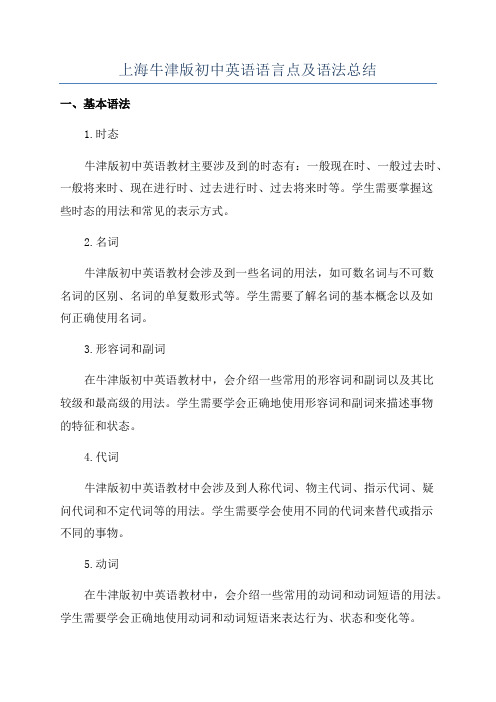
上海牛津版初中英语语言点及语法总结一、基本语法1.时态牛津版初中英语教材主要涉及到的时态有:一般现在时、一般过去时、一般将来时、现在进行时、过去进行时、过去将来时等。
学生需要掌握这些时态的用法和常见的表示方式。
2.名词牛津版初中英语教材会涉及到一些名词的用法,如可数名词与不可数名词的区别、名词的单复数形式等。
学生需要了解名词的基本概念以及如何正确使用名词。
3.形容词和副词在牛津版初中英语教材中,会介绍一些常用的形容词和副词以及其比较级和最高级的用法。
学生需要学会正确地使用形容词和副词来描述事物的特征和状态。
4.代词牛津版初中英语教材中会涉及到人称代词、物主代词、指示代词、疑问代词和不定代词等的用法。
学生需要学会使用不同的代词来替代或指示不同的事物。
5.动词在牛津版初中英语教材中,会介绍一些常用的动词和动词短语的用法。
学生需要学会正确地使用动词和动词短语来表达行为、状态和变化等。
6.句子结构牛津版初中英语教材中会涉及到一些句子的结构,如肯定句、否定句、一般疑问句和特殊疑问句等的构成方式和用法。
学生需要学会正确地构造各种不同类型的句子。
7.从句牛津版初中英语教材中会介绍一些常用的从句的用法,如宾语从句、定语从句和状语从句等。
学生需要学会理解从句的作用和用法,并正确地构造各种不同类型的从句。
二、语言点1.日常交际用语牛津版初中英语教材中注重培养学生的交际能力,会提供一些日常生活中常用的交际用语。
学生需要学会运用这些用语与他人进行正常的日常交流。
2.生活常识和文化知识牛津版初中英语教材中会涉及到一些生活常识和文化知识,如国家、城市、节日、传统习俗等。
学生需要了解这些常识和知识,扩大自己的视野和知识面。
3.阅读理解和听力牛津版初中英语教材中提供了一些阅读理解和听力训练的材料,帮助学生提高自己的阅读理解和听力技能。
学生需要通过阅读和听力训练,培养自己的语言理解和应用能力。
4.写作技巧牛津版初中英语教材中会介绍一些写作技巧,如如何写日记、如何写情书、如何写旅行日志等。
上海重点初中英语语言点及语法总结归纳
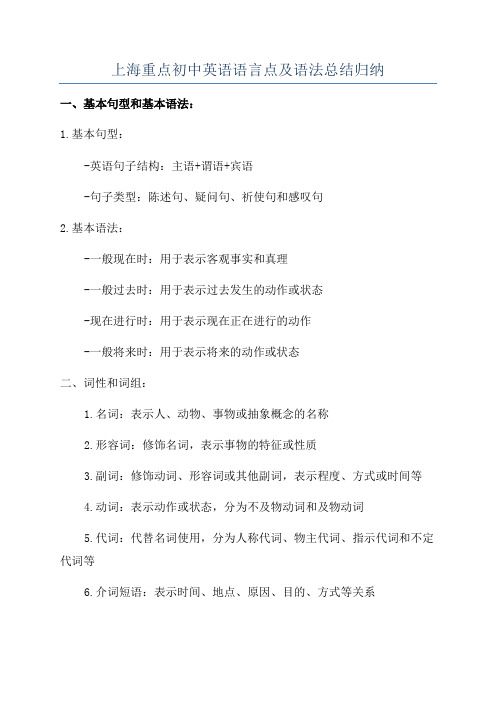
上海重点初中英语语言点及语法总结归纳一、基本句型和基本语法:1.基本句型:-英语句子结构:主语+谓语+宾语-句子类型:陈述句、疑问句、祈使句和感叹句2.基本语法:-一般现在时:用于表示客观事实和真理-一般过去时:用于表示过去发生的动作或状态-现在进行时:用于表示现在正在进行的动作-一般将来时:用于表示将来的动作或状态二、词性和词组:1.名词:表示人、动物、事物或抽象概念的名称2.形容词:修饰名词,表示事物的特征或性质3.副词:修饰动词、形容词或其他副词,表示程度、方式或时间等4.动词:表示动作或状态,分为不及物动词和及物动词5.代词:代替名词使用,分为人称代词、物主代词、指示代词和不定代词等6.介词短语:表示时间、地点、原因、目的、方式等关系7. 固定短语:常用的固定搭配,如"look forward to"、"take place"等三、语法:1.一般现在时的用法:- 表示客观事实和真理,如"The sun rises in the east."- 表示经常、频率或习惯性的动作,如"I usually go to bed at 10 o'clock."- 表示通用真理,如"Water boils at 100 degrees Celsius."- 表示感觉、态度或观点,如"I like reading books."2.一般过去时的用法:- 表示过去具体的动作或状态,如"I played football yesterday."- 表示过去的习惯动作,如"Every day, he went to school by bus."- 表示过去的经常性动作,如"We often visited our grandparents on weekends."3.现在进行时的用法:- 表示现在正在进行或发生的动作,如"She is watching TV now."- 表示将来的安排或计划,如"I am meeting my friends this afternoon."- 表示不断重复的动作,如"He is always talking in class."4.一般将来时的用法:- 表示将来即将发生或计划中的动作,如"We will go shopping tomorrow."-表示将来的打算或意愿- 表示将来的预测或推测,如"It will rain tomorrow."5. 过去进行时的用法:表示过去一些时间正在进行的动作或事情,如"She was reading a book yesterday evening."总结:以上是对上海(牛津版)初中英语教材的重点语言点和语法进行的总结归纳。
上海重点初中语法点汇总(牛津版)
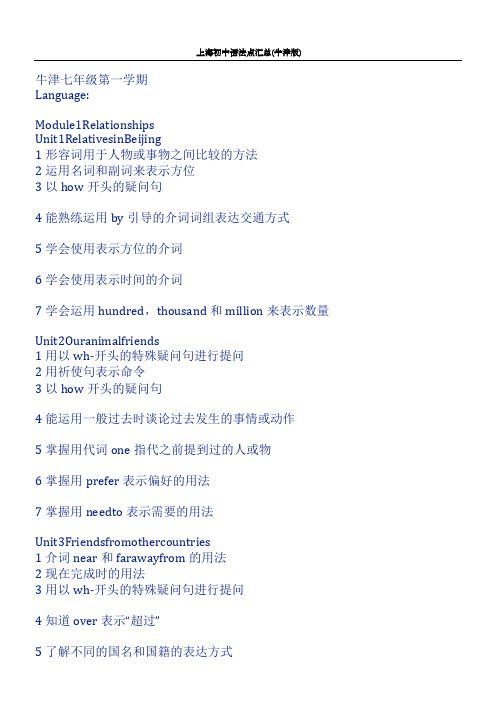
上海初中语法点汇总(牛津版)牛津七年级第一学期Language:Module1RelationshipsUnit1RelativesinBeijing1形容词用于人物或事物之间比较的方法2运用名词和副词来表示方位3以how开头的疑问句4能熟练运用by引导的介词词组表达交通方式5学会使用表示方位的介词6学会使用表示时间的介词7学会运用hundred,thousand和million来表示数量Unit2Ouranimalfriends1用以wh-开头的特殊疑问句进行提问2用祈使句表示命令3以how开头的疑问句4能运用一般过去时谈论过去发生的事情或动作5掌握用代词one指代之前提到过的人或物6掌握用prefer表示偏好的用法7掌握用needto表示需要的用法Unit3Friendsfromothercountries1介词near和farawayfrom的用法2现在完成时的用法3用以wh-开头的特殊疑问句进行提问4知道over表示“超过”6掌握用therebe句型表示客观存在7掌握描述人物各类信息的有关名词Module2MyneighbourhoodUnit4Jobspeopledo1yes/no问句(一般疑问句的结构)2一般现在时的用法3用以wh-开头的特殊疑问句进行提问4一般过去时态5熟练一些职业名词6学会用有关副词表示事情发展的先后顺序7熟悉work搭配不同介词的用法8掌握both的使用方法Unit5Choosinganewflat1方位介词和介词词组的用法2祈使句3掌握用too加上形容词表示“太。
”的用法4掌握need后面直接加名词表示“需要”的用法5学会用某些副词修饰形容词的比较级6了解形容词最高级的用法Unit6Differentplaces1现在进行时的用法2掌握when引导时间状语从句的用法3学会运用because引导的原因状语从句4therebe5用以wh-开头的特殊疑问句进行提问7掌握“itis+形容词+todo...”的句型8掌握乘坐交通工具的两种用法:by..., takethe...9掌握some,any,much,alotof的用法Unit7Signsaroundus1掌握情态动词can和must在本单元中的用法2用以wh-开头的特殊疑问句进行提问3了解turn作名词和动词的用法4了解land作名词和动词的用法5学会用“whatkindof+名词”询问种类Module3DietandhealthUnit8Growinghealthy,growingstrong1掌握so/neither引导的倒装句2连词if的用法3情态动词:usedto的用法4学会使用数量词5学会用shallwe和let's等表示建议6掌握less,fewer和more的用法7学会用not...anylonger表示“不再”Unit9Internationalfoodfestival1用以wh-开头的特殊疑问句进行提问2How引导的问句3一般过去时态4祈使句5了解一些国名的形容词形式7掌握动词hope的用法8掌握句型whatdoyouthinkabout...的用法9熟悉词组hearfrom意思和用法Unit10Abirthdayparty1一般将来时begoingto的用法2时间副词:firstly3情态动词:wouldlike4掌握常见的电话用语5学会用一般现在时表示将来6学会感官动词后加形容词的用法7掌握wouldratherdosomething的用法8掌握needtodosomething的用法Unit11Myfoodproject1用以wh-开头的特殊疑问句进行提问2How引导的问句3掌握两个动词词组get...From...和get...to...的用法4掌握freeze和frozen的用法5掌握“keepsomething+形容词”的用法牛津七年级第二学期Language:Module1GardenCityanditsneighboursUnit1Writingatravelguide1情态动词:can(ability)的用法2由if引导的条件状语从句的用法:Ifyougoto...,youwillfind/see... 3Wh-问句:Whatwould...4能够熟练运用表示方位的介词5学习现在完成时的用法6学习“oneof+形容词最高级+复数名词”的句型7学会使用so引导的结果状语从句Unit2Goingtoseeafilm1介词into和along的用法2用连词so和neither引导的倒装句3掌握用句型it'sa/an...about...来描述事物的用法4学会运用表示建议的句型5能够运用表示先后顺序的副词6学会使用指引方向的短语Unit3AvisittoGardenCity1现在完成时中for和since的用法2现在完成时的用法3学会使用反意疑问句4掌握各种职业名称并了解其工作内容5掌握beusedfordoingsth的用法Unit4Let'sgoshopping1一般现在时态2用介词短语和形容词来描述物品4掌握句型“wherewillwegotobuy...”的用法5掌握need作实义动词时的用法6学会不定代词的用法7掌握英语中描述衣物特征的说法8学会英语中不同尺码的表达Module2BetterfutureUnit5Whatcanwelearnfromothers1连词Although...,...2掌握一般过去时的用法3掌握让步状语从句的用法4学习other,theother,others,theothers等不定代词的用法5了解频度副词在句中的位置Unit6Hardworkforabetterlife1用形容词描述事件2动名词:startgrowing/wakingup/falling3学习动名词和动词不定式的用法4掌握句型it's+形容词+todosth的用法5学习时间状语从句的用法6掌握形容词和副词的用法Unit7inthefuture1能熟练运用ithinkso/idon'tthinkso等来表达同意或不同意2将来时态:will,beableto3掌握句型“whatdoyouthinkwillhappen...”4掌握hope的用法5学习用“in+一段时间”表示将来时间的用法Unit8AmoreenjoyableschoollifeModule3ThenaturalelementsUnit9Thewindisblowing2表示先后顺序的副词4掌握形容词的最高级的用法5掌握不定代词的用法6学习祈使句的用法Unit10WaterFestivalUnit11Electricity1Wh-问句:what/where/why...2How引导的问句:Howmany...3掌握see的两种用法4掌握不定代词none的用法5复习表达花销的方式6复习家用电器的名称牛津八年级第一学期Chapter1Aletterfromapen-friend1以what,where,when,hoeold,howmany等开头的特殊疑问句的用法;answers 2不定代词a和an的用法3定语从句4重点生词:ambition,enclose等5重点词组:enjoydoing...喜欢做playchess下象棋6培养通过上下文语境猜测生词词义的能力7认识工具书,并学会用字母表顺序排列单词的用法8学习书信写作的格式,书信内容的表达Chapter2Adayinthelifeof...Whiz-kidwendy1根据所给材料用一般现在时态谈论某人的一天2程度副词和短语3重点词组:(be)responsiblefor负责4重点句型:(not)oldenoughtodo...不够年长而不能做......5掌握at,in,on作介词表时间时的用法6了解更多有关职业的词汇7学习always,usually,often,sometimes,seldom,never等副词在一般现在时态中的用法8掌握在疑问句,礼貌用语中语气的变化9根据所给材料用一般现在时态谈论某人的一天Chapter3Dealingwithtrouble1学会描述过去发生的事情2复习动词过去式,过去分词,掌握一般过去时的用法3重点单词:argument,through,aboard,watch,dial,robbery,detail等4重点词组:shoutat对......大叫stareat盯着看hurryaboard匆匆上船inhandcuffs带着手铐Chapter4Numbers:Everyone'slanguage1学习用英语方法表述数字的写法和读法2学习用英语方法表述数学中的加,减,乘,除3用祈使句表达命令和指示4重点单词:system,invent,calculate,electronic,program,instruction等5重点词组:intens十进制consistof由......组成6重点句型:so...That...如此......以至......7学习几个国家名及其相应的词性变化Chapter5Lookitup!1学会说出物品的制作材料2指示代词3可数和不可数名词4重点单词:harmful(adj)有害的—harmless(adj)无害的mouse(n)老鼠—mice(pl)老鼠amuse(v)引起乐趣—amusement(n)娱乐think(v)思想—thinker(n)思想家create(v)创造—creative(adj)有创造力的5重点词组:seesomebodydoingsomething看见某人正在做某事6复习hundred,thousand的使用方法7学会使用百科全书Chapter6Nobodywins(PartI)1熟练运用一般将来时,注意一般将来时的两种情况(begoingto/will)及其时2学会描述将来要发生的事情3重点词组:runoutof用法atdawn在凌晨roarwithlaughter大笑着吼道4重点句型:itistruethat..........是真实的5词性变化:lose(v)丢失—lost(adj)丢失的,迷路的explore(v)开发—unexplored(adj)未探索过的6学会直接或婉转地表达自己的意愿7能熟练地应对how,what,why等特殊疑问句,并发挥想象力,表达自己的感想Chapter7Nobodywins(PartII)1不定代词some,any,somebody,someone和something等复合不定代词的用法2方位介词3重点词组:liedownonthebed躺在床上fallasleep入睡escapefrom逃离。
新版上海牛津版七年级(上册)语法
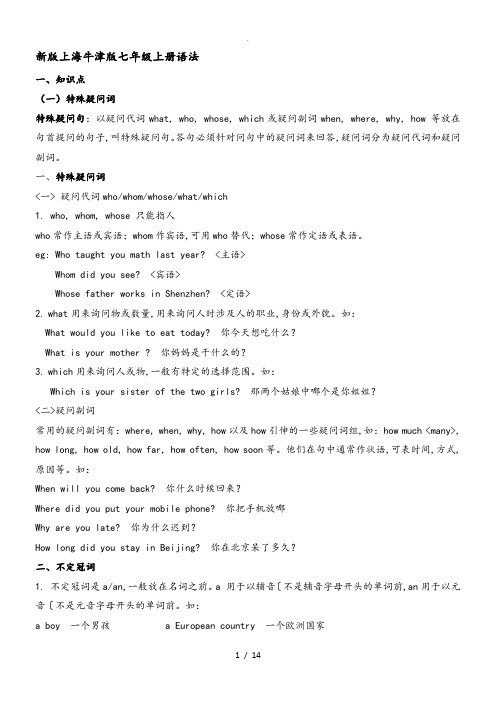
新版上海牛津版七年级上册语法一、知识点(一)特殊疑问词特殊疑问句:以疑问代词what, who, whose, which或疑问副词when, where, why, how 等放在句首提问的句子,叫特殊疑问句。
答句必须针对问句中的疑问词来回答,疑问词分为疑问代词和疑问副词。
一、特殊疑问词<一> 疑问代词who/whom/whose/what/which1. who, whom, whose 只能指人who常作主语或宾语;whom作宾语,可用who替代;whose常作定语或表语。
eg: Who taught you math last year? <主语>Whom did you see? <宾语>Whose father works in Shenzhen? <定语>2.what用来询问物或数量,用来询问人时涉及人的职业,身份或外貌。
如:What would you like to eat today? 你今天想吃什么?What is your mother ? 你妈妈是干什么的?3.which用来询问人或物,一般有特定的选择范围。
如:Which is your sister of the two girls? 那两个姑娘中哪个是你姐姐?<二>疑问副词常用的疑问副词有:where, when, why, how以及how引伸的一些疑问词组,如:how much <many>, how long, how old, how far, how often, how soon等。
他们在句中通常作状语,可表时间,方式,原因等。
如:When will you come back? 你什么时候回来?Where did you put your mobile phone? 你把手机放哪Why are you late? 你为什么迟到?How long did you stay in Beijing? 你在北京呆了多久?二、不定冠词1. 不定冠词是a/an,一般放在名词之前。
牛津上海版初中英语各单元知识点(完整资料).doc
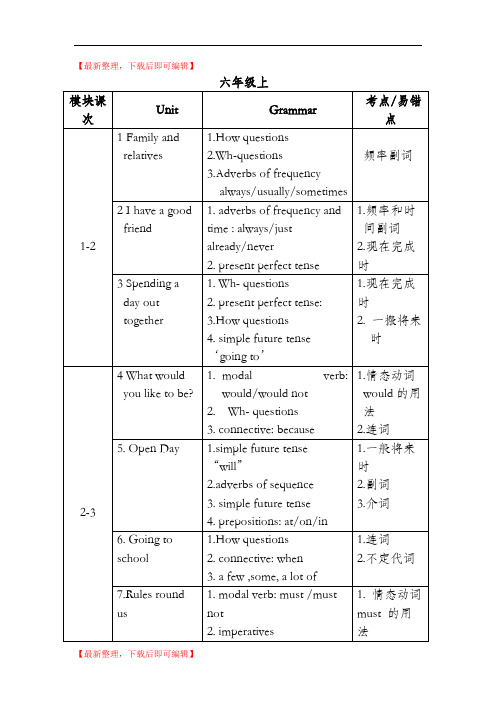
【最新整理,下载后即可编辑】
六年级上
现在完成时,不定代词:a few, some, a lot of
六年级(下)
一.共分为11个单元,各单元内容为:
六年级下
句型,一般将来时
七年级(上)
一.共分为11个单元,各单元内容为:
七年级上
七年级(下)
一.共分为11个单元,各单元内容为:
七年级下
重点:介词的使用,代词:物主代词,反身代词,形容词,现在完成时
八年级(上)
一.共分为7个单元,各单元内容为:
八年级上
词作状语
八年级(下)
一.共分为7个单元,各单元内容为:
八年级下
to 句型,情态动词的用法,现在进行时
九年级(上)
一
. 共分为7个单元,各单元内容为:
九年级上
九年级(下)
一.共分为5个单元,各单元内容为:
九年级下
时。
- 1、下载文档前请自行甄别文档内容的完整性,平台不提供额外的编辑、内容补充、找答案等附加服务。
- 2、"仅部分预览"的文档,不可在线预览部分如存在完整性等问题,可反馈申请退款(可完整预览的文档不适用该条件!)。
- 3、如文档侵犯您的权益,请联系客服反馈,我们会尽快为您处理(人工客服工作时间:9:00-18:30)。
上海(牛津版)初中英语语言点及语法总结6A Contents AbstractModule Unit Reading Language PointsHow questions1Family andA family tree Wh-questionsrelatives(P2)Adverbs of frequencyGood friends Adverbs of frequency2 I have a goodRemarks重点是How-questions和Wh-questions 的运用重点是现在完成时态的1 Family andfriendsand timeFriends offriend(P9)the earth Present perfect tenseWh-questions概念理解和简单运用重点是现在完成时的运3 Spend a day Present perfect tenseout Green islandHow-questionstogether(P16)Simple future tense用以及一般将来时的特殊形式“ going to”的运用“going to”Modal verb:4. What would you Interviewingwould/would notlike to be? (P26) a doctor Wh-questionsConnective: becauseSimple future tense“ will ”Open DayAdverbs of sequenceprogramme5 Open Day (P32)2 Places andSimple past tenseOn Open DayactivitiesPrepositions:at,on,inTravelling 重点是情态动词would的用法重点是一般将来时和一般过去时的用法;难点在于几个介词的用法比较: at, on,intime to 6 Going to How questions重点是 a few, some aschoolschool(P39)Connective: when lot of等修饰数量的Simon’ s way to school A few, some, a lot of限定词的用用法7 Rules around Rules and Modal verb: must/must重点是祈使句的用法及us(P45)signs not情态动词must的用法imperativesWh-questions8 The food we重点是现在完成时的基Dinner menu Present perfect tenseeat(P55)本用法和运用Prepositions: in, atModal verbs:shall,重点是情态动词:9 Picnics are fun Planning awould,may shall, would may的用(P62)picnicConnective: because法3 The naturalA little, some, plentyworldof , a lot of10 Healthy Good diets Adjectives to make重点是情态动词eating(P69)and bad diets comparisons should的用法Modal verb:should/should notII Let ’ s make a Howto make a重点是名词短语和几个Noun phrasespizza(P77)pizza介词 on, in,Adverbs of sequence above,belowPrepositions: on, in,above, below6B Contents AbstractModule Unit Reading Language PointsHow questionsPreposition: by1 Great citiesGerund: Great cities inin Asia(P2)like/enjoy/love Asia(P4)doing1 City life Adverbs to showposition2 At the A trip to LosPrepositions: in, forairport(P8)Angeles(P8)Present perfect tenseRemarks重点是几个接动名词做宾语的动词:like, enjoy, love重点是现在完成时的用法3 Dragon BoatQu Yuan and the Modal verb: would重点是情态动词Festival(P14)Dragon BoatFestival(P14)Indoor and 4 Stayingoutdoor healthy(P21)activities(P21)Prepositions: with,withoutConnective: butWh-questionsHow questionsConnective: becauseAdverbs of degree andfrequencyAdjectives towould 的用法重点是几个程度副词(too much ,more,less, fewer )和频度副词 (once,twice_times) 的运用5 What will I be My possiblefuture(P33)describe peopleSimple future tense重点是情态动词havelike?(P33)What will y ou beModal verb: have toto的用法2 Changeslike?(P37)Adverbs of sequenceUniforms for 6 Seasonaldifferent changes(P40)seasons(P40)Modal verb: mustMany, not many重点是情态动词must的用法Connective: because Pronouns to show7 Travelling inquantities重点是一些数量代词Travelling byGarden City Adjectives to make的用法( all of, mostbus(P46)(P46)comparisons of, someof,none of )Simple future tenseConnective: when8 Windy The Modal verbs: can,重点是情态动词can,weather(P57)typhoon(P757)may, should may, should的用法Adverbs of manner3 The natural9 Sea water and The oceans, rain Connective: if重点是连词 if的用worldrain water(P62)and water(P62)Preposition: by法Preposition: from10 Forests and重点是掌握描述物体Forests(P70) land(P70)Adjectives to的一些形容词describe objectsModal verbs: may,must重点是情态动词may,II Controlling Taking about must 的用法;还有介There befire(P77)fire(P77)词outside, near ,onPrepositions :的用法outside, near, on7A Contents AbstractModule Unit Reading Language PointsAdjectives to makecomparisons1.Relatives in Welcome toNouns and adverbs toBeijing (P2)Beijing1.show position RelationshipsHow questions2.Our animal Animals, ourWh-questionsfriends(P10)friendsHow questionsRemarksPresent perfect tenseWh-questionsSimple future tense“be goingto ”Simple presenttenseImperatives Connective: if Prepositions: near,3.Friends fromThere be ⋯far away fromForeigners in2.My neighbourhood other countriesGarden City Wh-questions(P27)Present perfect tenseWh-questionsPeople ’ s jobs4. Jobs people doDifferentYes/No questions(P.27)people and Simple present tensedifferent jobsSimple past tenseImperatives5. Choosing a new Thinking aboutPrepositions offlat (P35) a removalpositionThere be6. Different Kitty ’s newplaces (p42)Wh-questionsflatPresent continuousModal verb: wouldlikePast continuoustenseModal verbs: needPronoun: itSimple presenttense3.Diet andhealthtenseConnectives: when,becauseModal verbs: can,There be ⋯..7. Signs around Signs andmust(not)Preposition: in on us (P48)rulesWh-questions atSo⋯/Neither⋯Modal verb: shall,Connective: ifshould8. GrowingTo be a healthyhealthy, growingModal verb: used tochild Connective: if strong (P59)Quantifiers toSimple past tensedescribe amountsWh-questions9. International DifferentHow questionsSimple future Food Festival foods of fortense(be going to ) (P67)Simple past tensethe festivalImperativesSimple future tense“ going to ”Preparing forWh-questions10. A birthdayBen’s Adverbs of sequenceparty (P75)Modal verb: shallbirthday partyModal verbs: wouldlikeAn interviewII. My food Wh-questions Model verb: wouldat the frozenproject (P83)How questions likefood factory7B Contents AbstractModule Unit Reading Language Points RemarksShanghai-anWh-questions1.Writing ainteresting Modal verb: can There be ⋯1. Garden City travel guideand its cityConnective: ifneighbours2.Going to see a Choosing a Prepositions: intofilm film alongImperativesSo⋯ neither ⋯Prepositions: for,Wh-questions3. A visit to Relatives andsinceSimple present Garden City their jobsPresent perfect tense tense4. Let ’s goGoing shopping shopping5. What can we The happylearn from farmer and hisothers?wife Prepositional phrasesand adjectives toSimple future tensedescribe objects( be going to,will)Simple present tenseConnective: although Simple past tense2. BetterA poemAdjectives tofuture 6. Hard work for aThebetter lifegrasshopperand the antPresent continuous describe eventstense Start doing7. In the future Our hopesSimple future tenseThere will(not) be“will”8. A moreMy ideal enjoyable schoolschoolAgreement anddisagreementModal verb: wouldReflexive pronouns toModal verb: canlife9. The wind is Mr wind and Mridentify peopleAdjectives to makecomparisons anddescribe peopleWh-questionsblowing sun3.The naturalelementsPreparing forAdverbs of sequencePronouns to identifypossessionConnective: whenSimple past tense10. Waterthe Water FestivalFestivalImperatives Present perfecttense Prepositions: near,atElectricityaround us Wh- questionsConnective: when, II. ElectricitybutThe Airport How- questionsExpress8A Contents AbstractModule Unit Reading Grammar points RemarksSimple presentAsking Wh-questionsA letter from atense and How questions1. PenfriendspenfriendSimple futureUsing a and antense(will)1. My life A day in the The simple presentlife of⋯tense2. Work and play ImperativesWhizz-kid Adverbs and adverbialWendy phrases of frequency3. Trouble!Dealing with The simple past tensePast continuoustrouble Adverbial phrases for tensethe pastCardinal and ordinalnumbersDecimals andNumbers:fractions4. Numbers everyone ’ s Modal verb: shouldInstructions andlanguage2. Amazingthings5.statements aboutnumbersimperativesCountable anduncountable nounsLook it up!Simple past tenseEncyclopaediasUsing another andotherThe simple future3.Science Simple past tense6. Nobody wins(I)Caught by Gork tense(will)fictionThere beThe simple futuretense(be going to ) Adverbs and adverbial phrases for the future Asking questions using question tagsPreposition oflocationUsing some and anyPrepositions: on, in, beside, under,7. Nobody Escaping fromUsing somebody,wins(II)Gorkabove, next to ,insomeone, something,front of , behind,etc.betweenExclamations8B Contents AbstractModule Unit Reading Grammar points Remarks1. Nature and Pollution The present1. Tress Gerund:-ing environment fighters continuous tense2. Water Water talk Talking about amountsModal verbs: can,A dangerous Past continuoustense3. Electricity must, may Passive voiceservantObject clauses(I)Modal verbs: should,A new4. Newspapers ought to It ’s great that⋯newspaperObject clauses(II)2. Mass mediaBlind man and5. Magazine Using pronouns Connective: as sooneyes in firearticlesAdverbial clause(I)dramaUsing the3. Leisure France is6. Travel timeUsing conjunctions:callingand, but, soasPassive voiceUsing who and whose1. My Dad atOn the buildingUsing mine, yours,sitehome and at7. Poems his, hers, ours,work At worktheirs2. My schoolFeel like doingUsing one and ones9A Contents AbstractModule Unit Reading Grammar points Remarks1. Ancient GreeceThe night ofthe horse The present perfecttenseImperatives1. Myths,Fishing with2. Traditionaltraditions Passive voice(I)Object sentencesbirdsskillsand opinionsPassive voice(II)3. Pets Head to head Simple past tenseUsing adverbsComparison ofIt is4. Computers Computer facts adjectives+adjective+noun2. ComputersComparison of adverbsthatVS humans5. The humanMemory Adverbial clause(II)If sentences brainProtecting the6. Detectives Using infinitives Wh-questions innocent3.Fightingcrime7. Escaping fromComic strips Using adjectives Be+adiectives kidnappers。
